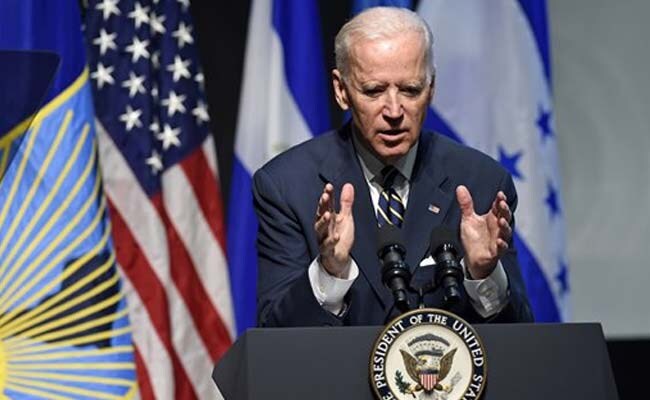
US Vice President Joe Biden will attend Balkans summit today.
Zagreb:
US Vice President Joe Biden will attend a Western Balkans summit today, highlighting renewed interest from Washington in the fragile region as it deals with an unprecedented influx of refugees.
The meeting in Zagreb, attended by eight heads of state and European Union President Donald Tusk, aims to boost "cooperation and mutual trust at a moment of increased security risks", said Slovenian President Borut Pahor, who is co-hosting the summit.
Few details of the agenda have been released, but the migrant crisis and concerns over global terror threats in the wake of this month's deadly Paris attacks are expected to loom large over the one-day talks.
"The US is arriving in a bid to avoid destabilisation of the region, notably in the light of new threats," said Lidija Cehulic-Vukadinovic, international relations professor at Zagreb University.
"The Balkans remains a potential powder keg," she told AFP.
The region is burdened by the legacy of the 1990s wars that accompanied the break-up of the former Yugoslavia, and it was a US-brokered peace deal 20 years ago that ended the bloodiest conflict in Bosnia.
The Western Balkans still face numerous challenges, from high youth unemployment and slow economic reforms to fragile inter-ethnic relations and threats from a small number of homegrown Islamic extremists, particularly in Bosnia.
Analysts said Biden's visit signalled a return of Washington's interest in the region, having shifted its focus since the 1990s to the Middle East and ceded watch over the Balkans to the European Union.
"The US is back at the table. Europe has failed to resolve many issues" in the Western Balkans, Cehulic-Vukadinovic said.
'Right Moment'
In recent months, hundreds of thousands of migrants and refugees fleeing war and poverty in the Middle East, Asia and Africa have travelled from Greece along the so-called Balkans route to northern Europe.
The crisis has at times strained relations between Western Balkan neighbours and former foes as they grapple with how best to manage the huge influx.
Countries on the route said last week that they were restricting the crossings of economic migrants and allowing in only people from war-torn countries such as Syria, Iraq and Afghanistan, sparking protests from others stuck at the Greek-Macedonian border.
The United Nations has warned that the tightening of restrictions is creating an increasingly untenable situation, stranding many outdoors as temperatures plunge.
Croatian President Kolinda Grabar-Kitarovic said that today's Brdo-Brijuni Summit, the fourth of its kind since 2013, was being held "at the right moment".
She also suggested that Biden's participation reflected efforts by the United States to become more involved in security issues in southeastern Europe.
Along with European Union members Slovenia and Croatia, the summit will be attended by the presidents of Albania, Bosnia, Kosovo, Macedonia, Montenegro and Serbia, all of which aspire to join the EU.
The meeting in Zagreb, attended by eight heads of state and European Union President Donald Tusk, aims to boost "cooperation and mutual trust at a moment of increased security risks", said Slovenian President Borut Pahor, who is co-hosting the summit.
Few details of the agenda have been released, but the migrant crisis and concerns over global terror threats in the wake of this month's deadly Paris attacks are expected to loom large over the one-day talks.
"The US is arriving in a bid to avoid destabilisation of the region, notably in the light of new threats," said Lidija Cehulic-Vukadinovic, international relations professor at Zagreb University.
"The Balkans remains a potential powder keg," she told AFP.
The region is burdened by the legacy of the 1990s wars that accompanied the break-up of the former Yugoslavia, and it was a US-brokered peace deal 20 years ago that ended the bloodiest conflict in Bosnia.
The Western Balkans still face numerous challenges, from high youth unemployment and slow economic reforms to fragile inter-ethnic relations and threats from a small number of homegrown Islamic extremists, particularly in Bosnia.
Analysts said Biden's visit signalled a return of Washington's interest in the region, having shifted its focus since the 1990s to the Middle East and ceded watch over the Balkans to the European Union.
"The US is back at the table. Europe has failed to resolve many issues" in the Western Balkans, Cehulic-Vukadinovic said.
'Right Moment'
In recent months, hundreds of thousands of migrants and refugees fleeing war and poverty in the Middle East, Asia and Africa have travelled from Greece along the so-called Balkans route to northern Europe.
The crisis has at times strained relations between Western Balkan neighbours and former foes as they grapple with how best to manage the huge influx.
Countries on the route said last week that they were restricting the crossings of economic migrants and allowing in only people from war-torn countries such as Syria, Iraq and Afghanistan, sparking protests from others stuck at the Greek-Macedonian border.
The United Nations has warned that the tightening of restrictions is creating an increasingly untenable situation, stranding many outdoors as temperatures plunge.
Croatian President Kolinda Grabar-Kitarovic said that today's Brdo-Brijuni Summit, the fourth of its kind since 2013, was being held "at the right moment".
She also suggested that Biden's participation reflected efforts by the United States to become more involved in security issues in southeastern Europe.
Along with European Union members Slovenia and Croatia, the summit will be attended by the presidents of Albania, Bosnia, Kosovo, Macedonia, Montenegro and Serbia, all of which aspire to join the EU.
Track Latest News Live on NDTV.com and get news updates from India and around the world

